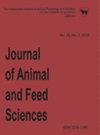Effects of Entodinium caudatum monocultures in an acidotic environment on in vitro rumen fermentation
IF 1.5
4区 农林科学
Q3 AGRICULTURE, DAIRY & ANIMAL SCIENCE
引用次数: 0
Abstract
. The study evaluated the effect of Entodinium caudatum on the prevention of subacute ruminal acidosis (SARA) in vitro . Different proportions of wheat and corn [100% wheat (W); 75% wheat and 25% corn (W75); 50% wheat and 50% corn (WC); 75% corn and 25% wheat (C75); and 100% corn (C)] were used to create an in vitro acidotic environment. The activity of E. caudatum was determined by adding defaunated rumen fluid and protozoan monocultures to the substrates. The effect of E. caudatum monoculture on pH was insignificant, while a significant influence of grain type was observed on ammonia (NH 3 -N) formation. E. caudatum inoculation decreased lactic acid concentration throughout the incubation period and shortened the fermentation start time (lag time). The specific fermentation rate (SFR), which increased with the wheat ratio, was reduced by E. caudatum culture . The total gas production varied depending on the substrate and was increased by E. caudatum . Protozoan monoculture decreased propionic acid levels, while it increased methane production. As a result, E. caudatum stimulated earlier fermentation, but decreased lactic acid production by reducing SFR. It is believed that the instantenuous phagocytosis of E. caudatum (iodophilic storage) to digest starch particles prevents rapid bacterial fermentation in the rumen fluid, and thus limit lactic acid production. The results of this work may support future in vitro studies requiring E. caudatum monoculture, as well as in vivo studies investigating the effect of E. caudatum on the inhibition of SARA formation.尾虫在酸性环境中的单一培养对体外瘤胃发酵的影响
本研究评价了尾状虫对体外预防亚急性瘤胃酸中毒(SARA)的作用。使用不同比例的小麦和玉米[100%小麦(W);75%小麦和25%玉米(W75);50%小麦和50%玉米(WC);75%玉米和25%小麦(C75);以及100%玉米(C)]来创造体外酸性环境。通过在基质中加入脱脂瘤胃液和原生动物单一培养物来测定尾状藻的活性。尾藻单一栽培对pH值的影响不显著,而籽粒类型对氨(NH3-N)的形成有显著影响。尾藻接种降低了整个培养期的乳酸浓度,缩短了发酵开始时间(滞后时间)。尾藻培养降低了比发酵率(SFR),比发酵率随小麦配比的增加而增加。总产气量随基质的不同而变化,尾状藻的产气量增加。原生动物单一栽培降低了丙酸水平,同时增加了甲烷产量。结果,尾藻刺激了早期发酵,但通过降低SFR降低了乳酸产量。据信,尾藻(嗜碘储存)消化淀粉颗粒的瞬间吞噬作用阻止了瘤胃液中细菌的快速发酵,从而限制了乳酸的产生。这项工作的结果可能支持未来需要尾藻单培养的体外研究,以及研究尾藻对严重急性呼吸系统综合征形成抑制作用的体内研究。
本文章由计算机程序翻译,如有差异,请以英文原文为准。
求助全文
约1分钟内获得全文
求助全文
来源期刊

Journal of Animal and Feed Sciences
农林科学-奶制品与动物科学
CiteScore
2.10
自引率
0.00%
发文量
42
审稿时长
3 months
期刊介绍:
Journal of Animal and Feed Sciences (JAFS, J. Anim. Feed Sci.) has been published by the Kielanowski Institute of Animal Physiology and Nutrition, Polish Academy of Sciences in Jabłonna (Poland) since 1991. It is a continuation of the Polish-language journal Roczniki Nauk Rolniczych. Seria B, Zootechniczna published by the Polish Academy of Sciences since 1969.
JAFS is an international scientific journal published quarterly, about 40 papers per year including original papers, short communications and occasionally reviews. All papers are peer-reviewed and related to basic and applied researches in the field of animal breeding and genetics, physiology of nutrition, animal feeding, feed technology and food preservation. The journal distinguishes the multidisciplinary nature of physiological and nutritional sciences and so includes papers specialized in all fields connected with animal well-being, including molecular and cell biology and the emerging area of genetics.
 求助内容:
求助内容: 应助结果提醒方式:
应助结果提醒方式:


